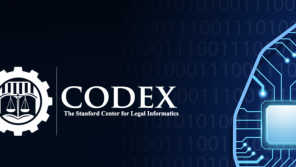In the dynamic legal practice environment of today, it is essential to stay on top of new developments in Legal Tech and Innovation. And what better way to do so than reading a good book? Whether you are a student looking to expand your knowledge and prepare for your future working life, a lawyer interested in learning something new and possibly making a change in your current everyday life or just someone with an interest for Legal Tech – this non-hierarchical and non-exhaustive list is for you.
Before we get started, it is advisable to have a look at an article that explores Artificial Intelligence (AI) Large Language Models (LLMs) like ChatGPT/GPT-4, detailing the advances and challenges in applying AI to law, to obtain an overview of the topic before diving deeper into more detailed works. Harry Surden’s “ChatGPT, Artificial Intelligence (AI) Large Language Models, and Law” (2024) first explains how these AI technologies work at an understandable level. It then examines the significant evolution of LLMs since 2022 and their improved capabilities in understanding and generating complex documents, such as legal texts. Finally, this Article discusses the limitations of these technologies, offering a balanced view of their potential role in legal work. It is available online, free of charge. And when you’re ready, have a look at our further recommendations:
- Larry A. DiMatteo et al., “The Cambridge Handbook of Lawyering in the Digital Age”, 2021: We are starting off this list with this comprehensive handbook, which examines the developments of the legal profession and the changing legal landscape by providing perspectives from multiple interested parties, including practitioners, academics, and legal tech companies from different legal systems. Scrutinizing the real implications posed by legal tech, the book advocates for an unbiased, cautious approach for the engagement of technology in legal practice. It also carefully addresses the core question of how to balance fears of industry takeover by technology with the potential for using legal tech to expand services and create value for clients.
- Noah Weisberg/Alexander Hudek, “AI For Lawyers: How Artificial Intelligence is Adding Value, Amplifying Expertise, and Transforming Careers”, 2021: This book will enable you to discover how artificial intelligence can improve how your organization practices law and in turn revolutionize its operations. This work is potentially interesting for any lawyer who either feels uneasy about how AI might change law or is looking to capitalize on the evolving practice.
- Adam Curphey, “The Legal Team of The Future”, 2022: Whether you are a student, a law school, a university, a law firm or an in-house legal team, “The Legal Team of the Future” is the definitive guide to understanding and building the holistic skills required of those working in legal services now and in the future. Highlighting the importance of multidisciplinary teams working collaboratively to solve legal problems, the book introduces a ‘Law+’ model for the profession, comprising sixteen skills across four quadrants: Law+People, Law+Business, Law+Change and Law+Technology. This book belongs on the bookshelf of anyone looking to navigate the future of the legal profession and to stay ahead of the pack in delivering legal services to clients.
- Lucy Endel Bassili, “The Simple Guide to Legal Innovation”, 2020: With countless articles and blogs on legal innovation, it is nearly impossible for attorneys to keep pace. However, this author is convinced that lawyers can continue to learn well into their years of practice. With some updated vocabulary and a few real examples, lawyers can learn to wow their clients. This book is supposed to help them on that journey, providing details on the legal ecosystem, rise of legal operations, top innovation concepts lawyers need to know and more. By providing bite-sized lessons on topics that every practicing lawyer should be familiar with, this book will keep attorneys from getting left behind.
- Emma Jones/Francine Ryan/Ann Thanaraj/Terry Wong, “Digital Lawyering – Technology and Legal Practice in the 21st Century”, 2022: This textbook provides an accessible and thorough introduction to digital lawyering, present and future, and a toolkit for gaining the key attributes and skills required to utilise technology within legal practice effectively. It introduces students to all key topics, from the role of blockchain to the use of digital evidence in courtrooms, supported by contemporary case studies and integrated, interactive activities.
- Fiona McLay, “Tech Enabled Lawyer: A guide to making the most of the tools you have and spotting the tech you need”, 2023: Whether you are working in a traditional law firm, a fledgling NewLaw business, a government department with inflexible systems or an in-house legal department with no budget, tech enabled lawyers are more valuable than ever to their clients and to their legal businesses. Tech Enabled Lawyer cuts through the endless noise about tech and innovation to guide you to a better way by making the most of your existing tech. This practical, commonsense guide follows a five-step framework to help you find the right next step to be more tech enabled. This book will have you running a tech enabled legal practice in no time, and includes specific use cases for litigation, estates, property, family, commercial and in-house.
- John D. Goodhue, “Law Prompts: Large Language Models for Lawyers”, 2023: Discover the transformative power of large language models in legal practice with this essential guide. Designed specifically for lawyers seeking to enhance their practice with the latest advancements in artificial intelligence, this book demystifies the intersection of law and machine learning, giving you the tools to navigate this brave new world. Whether you’re a tech-savvy lawyer eager to leverage AI or a legal professional dipping your toes into the world of machine learning, this book offers valuable insights and practical advice. It’s not just about staying relevant – it’s about being a pioneer. Don’t miss out on the AI revolution in law. This book is for anyone looking to transform their practice.
- Antoine Masson/Gavin Robinson, “Mapping Legal Innovation”, 2021: This book draws on the perspectives of lawyers and creative specialists to analyze the concept and life cycle of legal innovations, techniques and services, whether related to legislation, legal engineering, legal services, or legal strategies, as well as the role of law as a source of creativity and interdisciplinary collaboration.
- David Freeman Engstrom, “Legal Tech and the Future of Civil Justice”, 2023: New digital technologies, from AI-fired ‘legal tech’ tools to virtual proceedings, are transforming the legal system. But much of the debate surrounding legal tech has zoomed out to a nebulous future of ‘robo-judges’ and ‘robo-lawyers.’ This volume is an antidote. Zeroing in on the near- to medium-term, it provides a concrete, empirically minded synthesis of the impact of new digital technologies on litigation and access to justice. How far and fast can legal tech advance given regulatory, organizational, and technological constraints? How will new technologies affect lawyers and litigants, and how should procedural rules adapt? How can technology expand – or curtail – access to justice? And how must judicial administration change to promote healthy technological development and open courthouse doors for all? By engaging these essential questions, this volume helps to map the opportunities and the perils of a rapidly digitizing legal system – and provides grounded advice for a sensible path forward. This book is available as Open Access on Cambridge Core.
- Richard Susskind, “Tomorrow’s Lawyers – An Introduction to your Future”, 2023: This last one is pretty much a “classic” – in its first and second editions, Tomorrow’s Lawyers became an international bestseller, widely read and cited by practitioners and students. The third edition focuses on the law and lawyers in the 2020s. For Richard Susskind, the future of legal service is neither Grisham nor Rumpole. Instead, he predicts a world of online courts, AI-based global legal businesses, disruptive legal technologies, liberalized markets, commoditization, alternative sourcing, simulated practice on the metaverse, and many new legal jobs. This volume is a definitive and updated introduction to this future – for aspiring lawyers, and for all who want to modernize and upgrade our legal and justice systems. This work is a call to arms: it challenges those who feel that the law and lawyers are somehow immune from technological advance; it draws attention to the unaffordability and inaccessibility of legal service, for businesses and citizens alike; it invites the next generation of lawyers to harness the power of technology in improving and even overhauling the way in which legal and court service is currently provided. A must-read for legal undergraduates, aspiring and young lawyers, senior practitioners, leaders in law firms and legal businesses, law professors and law teachers.
If you have any further ideas or suggestions, please do not hesitate to contact us via info@legal-tech.blog.




